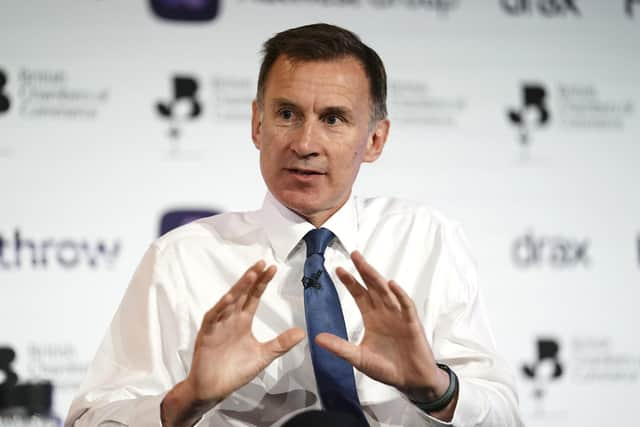Jeremy Hunt asks public to be "patient" with "painful" government measures to tackle inflation
Writing in the Mail on Sunday, Jeremy Hunt said that the Government is “absolutely committed” to supporting the Bank of England after it raised interest rates for the thirteenth successive time last week. At 5%, interest rates are now at their highest level since 2008.
Economists had expected the most recent increase to be a quarter of a percent, rather than the 0.5% increase that took place.
Advertisement
Hide AdAdvertisement
Hide AdIt is hoped that the increase in interest rates, which have been increasing incrementally since the beginning of 2022, will help to limit inflation which remained at 8.7% in May.


The increase in interest is expected to affect mortgage holders, who are now bracing for an increase in their monthly outgoings.
Mr Hunt said: “Despite how painful it is for many across Europe right now, one of the most effective methods of bringing inflation down is by increasing interest rates.
“It is working in other countries, and it will work here too. But we must be patient; things will get better.”
Advertisement
Hide AdAdvertisement
Hide AdHe said other countries are facing the same issues, “so ignore the predictable calls from those blaming Brexit”.
Experts have argued that extra red tape created by Brexit has contributed to a rise in food prices in the UK.
Inflation has dropped in other countries in recent months, including France, Germany and Spain - where the rate of inflation is currently 2.9%. This follows incremental increases in interest rates by the European Central Bank over the past 12 months.
In the United States inflation has dropped from 9.1% in June 2022 to 4% in May this year following increases in the Federal Reserve’s interest rate from 1% to 5% over the same period.
Advertisement
Hide AdAdvertisement
Hide AdThe Treasury chief warned that “if we don’t act now, it will be worse later”.
Mr Hunt pointed to measures he agreed with banks aimed at cooling the mortgage crisis, including allowing borrowers to extend the term of their mortgages or move to an interest-only plan temporarily.
The Chancellor concluded: “As the Bank of England takes the necessary steps to see us through this difficult time, we must hold our nerve. And as the Prime Minister said last week, we are going to get through this.”
Last week Rachel Reeves, the shadow chancellor, accused Sunak and Hunt of “burying their heads in the sand and failing to clean up the mess this Tory government has made”.
Advertisement
Hide AdAdvertisement
Hide AdSpeaking on the day the interest rate increase was announced, she said: “Families across Britain will be desperately worried about what today’s interest rate rise might mean for them.”
High street lenders and building societies have seen a fortnight of turmoil as they rushed to remove their cheaper mortgage deals before the latest increase in interest rates was announced. The average price of a two-year fixed-rate mortgage is now 6.19% - the highest since Liz Truss’s mini-budget.
In December 2021, the average cost of a two-year fixed-rate mortgage was 2.34%.
The average interest rate on a five-year fixed-term mortgage has increased in the same time period from 2.64% to 5.83%.
Comment Guidelines
National World encourages reader discussion on our stories. User feedback, insights and back-and-forth exchanges add a rich layer of context to reporting. Please review our Community Guidelines before commenting.
